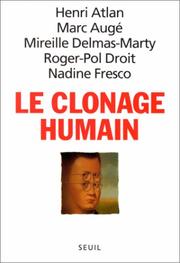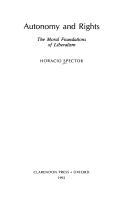| Listing 1 - 10 of 88 | << page >> |
Sort by
|

ISBN: 2020359030 9782020359030 Year: 1999 Publisher: Paris : Editions du Seuil,
Abstract | Keywords | Export | Availability | Bookmark
 Loading...
Loading...Choose an application
- Reference Manager
- EndNote
- RefWorks (Direct export to RefWorks)
Human cloning --- Clonage humain --- Moral and ethical aspects --- Human cloning - Moral and ethical aspects

ISBN: 0691016887 0691070881 1282753630 1400822904 9786612753633 1400811031 9780691070889 9780691016887 Year: 1999 Publisher: Princeton, New Jersey Chichester, UK Princeton University Press
Abstract | Keywords | Export | Availability | Bookmark
 Loading...
Loading...Choose an application
- Reference Manager
- EndNote
- RefWorks (Direct export to RefWorks)
Virtue has been rediscovered in the United States as a subject of public debate and of philosophical inquiry. Politicians from both parties, leading intellectuals, and concerned citizens from diverse backgrounds are addressing questions about the content of our character. William Bennett's moral guide for children, A Book of Virtues, was a national bestseller. Yet many continue to associate virtue with a prudish, Victorian morality or with crude attempts by government to legislate morals. Peter Berkowitz clarifies the fundamental issues, arguing that a certain ambivalence toward virtue reflects the liberal spirit at its best. Drawing on recent scholarship as well as classical political philosophy, he makes his case with penetrating analyses of four central figures in the making of modern liberalism: Hobbes, Locke, Kant, and Mill. These thinkers are usually understood to have neglected or disparaged virtue. Yet Berkowitz shows that they all believed that government resting on the fundamental premise of liberalism--the natural freedom and equality of all human beings--could not work unless citizens and officeholders possess particular qualities of mind and character. These virtues, which include reflective judgment, sympathetic imagination, self-restraint, the ability to cooperate, and toleration do not arise spontaneously but must be cultivated. Berkowitz explores the various strategies the thinkers employ as they seek to give virtue its due while respecting individual liberty. Liberals, he argues, must combine energy and forbearance, finding public and private ways to support such nongovernmental institutions as the family and voluntary associations. For these institutions, the liberal tradition powerfully suggests, play an indispensable role not only in forming the virtues on which liberal democracy depends but in overcoming the vices that it tends to engender. Clearly written and vigorously argued, this is a provocative work of political theory that speaks directly to complex issues at the heart of contemporary philosophy and public discussion. New Forum Books makes available to general readers outstanding, original, interdisciplinary scholarship with a special focus on the juncture of culture, law, and politics. New Forum Books is guided by the conviction that law and politics not only reflect culture, but help to shape it. Authors include leading political scientists, sociologists, legal scholars, philosophers, theologians, historians, and economists writing for nonspecialist readers and scholars across a range of fields. Looking at questions such as political equality, the concept of rights, the problem of virtue in liberal politics, crime and punishment, population, poverty, economic development, and the international legal and political order, New Forum Books seeks to explain--not explain away--the difficult issues we face today.
Liberalism --- Liberalism. --- Moral and ethical aspects. --- -Liberal egalitarianism --- Political philosophy. Social philosophy --- Moral and ethical aspects --- Liberal egalitarianism --- Liberty --- Political science --- Social sciences --- Liberalism - Moral and ethical aspects
Book
ISBN: 9780300235081 0300235089 Year: 2019 Publisher: New Haven,
Abstract | Keywords | Export | Availability | Bookmark
 Loading...
Loading...Choose an application
- Reference Manager
- EndNote
- RefWorks (Direct export to RefWorks)
An insightful and passionately written book explaining why a return to Enlightenment ideals is good for the world. The greatest challenges facing humankind, according to Deirdre McCloskey, are poverty and tyranny, both of which hold people back. Arguing for a return to true liberal values, this engaging and accessible book develops, defends, and demonstrates how embracing the ideas first espoused by eighteenth-century philosophers like Locke, Smith, Voltaire, and Wollstonecraft is good for everyone. With her trademark wit and deep understanding, McCloskey shows how the adoption of Enlightenment ideals of liberalism has propelled the freedom and prosperity that define the quality of a full life. In her view, liberalism leads to equality, but equality does not necessarily lead to liberalism-and the fixation of the left on inequality is counterproductive. Liberalism is an optimistic philosophy that depends on the power of rhetoric rather than arms and on ethics, free speech, and facts for us to thrive.
Liberalism --- Capitalism --- Economic history --- Liberty --- Moral and ethical aspects --- Economic order --- Economic history - Moral and ethical aspects --- Liberty - Moral and ethical aspects
Book
ISBN: 0198285337 9780198285335 Year: 1985 Publisher: Oxford Clarendon
Abstract | Keywords | Export | Availability | Bookmark
 Loading...
Loading...Choose an application
- Reference Manager
- EndNote
- RefWorks (Direct export to RefWorks)
Methodology of economics --- Economic sociology --- Capitalism --- Economics --- Industrial efficiency --- Moral and ethical aspects --- Philosophy --- Capitalism - Moral and ethical aspects --- Economics - Moral and ethical aspects --- Industrial efficiency - Moral and ethical aspects --- Economics - Philosophy
Book
ISBN: 9782842304256 284230425X Year: 2011 Publisher: Paris Hoëbeke
Abstract | Keywords | Export | Availability | Bookmark
 Loading...
Loading...Choose an application
- Reference Manager
- EndNote
- RefWorks (Direct export to RefWorks)
Pictures --- Photography --- Advertising --- Art and morals --- Moral and ethical aspects --- 700 --- 0 --- censure --- kunst algemeen --- art généralités --- Pictures - Moral and ethical aspects --- Photography - Moral and ethical aspects --- Advertising - Moral and ethical aspects
Book
ISBN: 9782296552333 Year: 2011 Publisher: Paris,
Abstract | Keywords | Export | Availability | Bookmark
 Loading...
Loading...Choose an application
- Reference Manager
- EndNote
- RefWorks (Direct export to RefWorks)
Capitalism --- Economics --- Capitalisme --- Economie politique --- Moral and ethical aspects. --- Moral and ethical aspects. --- Aspect moral --- Aspect moral

ISBN: 0521558506 0521552028 9780521552028 9780521558501 Year: 1996 Publisher: Cambridge ; New York, NY : Cambridge University Press,
Abstract | Keywords | Export | Availability | Bookmark
 Loading...
Loading...Choose an application
- Reference Manager
- EndNote
- RefWorks (Direct export to RefWorks)
Economics --- Moral and ethical aspects. --- 172 --- 330.1 --- 174.5 --- 174.5 Economische ethiek. Speculatie --- Economische ethiek. Speculatie --- Economic theory --- Political economy --- Social sciences --- Economic man --- Moral and ethical aspects --- Sociale ethiek --- Methodologie van de economie --- Social ethics --- Methodology of economics --- Economie politique --- Aspect moral --- filosofie --- ethiek --- economie (algemeen) --- Economics - Moral and ethical aspects --- Economics - Moral and ethical aspects. --- ECONOMICS --- MORAL AND ETHICAL ASPECTS

ISBN: 0198239211 9780198239215 Year: 1992 Publisher: Oxford [England] Clarendon Press
Abstract | Keywords | Export | Availability | Bookmark
 Loading...
Loading...Choose an application
- Reference Manager
- EndNote
- RefWorks (Direct export to RefWorks)
Political philosophy. Social philosophy --- General ethics --- Liberalism --- -Liberalism --- -Liberal egalitarianism --- Liberty --- Political science --- Social sciences --- Moral and ethical aspects --- Philosophy --- -Moral and ethical aspects --- Liberalism - Moral and ethical aspects. --- Liberalism - Philosophy.
Book
ISBN: 2800409312 9782800409313 Year: 1987 Volume: 1987 6 Publisher: Bruxelles: Éditions de l'Université de Bruxelles,
Abstract | Keywords | Export | Availability | Bookmark
 Loading...
Loading...Choose an application
- Reference Manager
- EndNote
- RefWorks (Direct export to RefWorks)
Ethique philosophique --- Sciences --- Wetenschappen --- Wijsgerige ethiek --- Science --- -Natural science --- Science of science --- Moral and ethical aspects --- -Moral and ethical aspects --- Science / et morale. (Mélanges) --- Wetenschap / en moraal. (Versch. onderwerpen) --- Science and ethics --- Science - Moral and ethical aspects --- Bioéthique --- Congrès

ISBN: 144118807X 9781441188076 0826450482 0826450474 9780826450470 9781474213097 147421309X 9780826477422 0826477429 9780826450487 0826450482 Year: 2002 Publisher: London Continuum
Abstract | Keywords | Export | Availability | Bookmark
 Loading...
Loading...Choose an application
- Reference Manager
- EndNote
- RefWorks (Direct export to RefWorks)
Value pluralism is the idea, associated with the late Isaiah Berlin, that fundamental human values are irreducibly plural and incommensurable. Ends like liberty, equality and community are intrinsic goods which can neither be ranked in an absolute hierarchy nor translated into units of a common denominator. If that is true, how can we choose among such values when they come into conflict in particular cases? In particular, what reason is there to justify the value ranking characteristic of liberal democracy, favouring personal autonomy and toleration? Recent commentators have seen value plural
Liberalism --- Social values. --- Pluralism. --- Monadology --- Monism --- Philosophy --- Reality --- Values --- Philosophy. --- Moral and ethical aspects. --- Pluralism --- Social values --- Moral and ethical aspects
| Listing 1 - 10 of 88 | << page >> |
Sort by
|

 Search
Search Feedback
Feedback About UniCat
About UniCat  Help
Help News
News